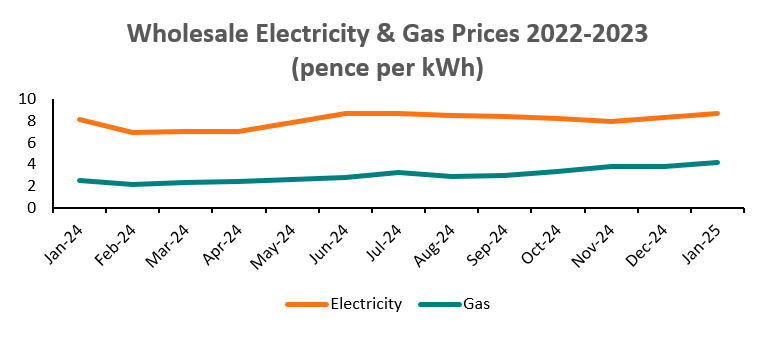Compare Latest Deals
Why pay more for the same energy?
Compare current business energy deals and complete your switch online in less than 30 seconds!
What would you like to compare today?
Lowest Unit Rates
Lowest Standing Charges

Compare Business Energy Rates From Top UK Suppliers
Wholesale Energy & Your Business Energy Bills
Wholesale energy prices in the UK are impacted by a variety of factors, but they can have a significant knock-on effect on your energy bills.
Depending on your contract type, the wholesale rate can have either a very large or negligible impact on your business energy costs.
Understanding wholesale energy prices can help you find best gas and electricity deals for your business. In this guide, we offer advice on what you need to know about the wholesale energy market and the latest wholesale electricity prices.
Get a new deal within 30 seconds!
Compare the Latest Energy Prices2025 Wholesale Energy Prices & Trends
Wholesale energy costs make up 42% of a typical dual fuel bill in the UK. However, this amount will obviously vary depending on if you run an SME or a much larger enterprise. An increase In the price of electricity or gas can have a huge impact on your energy bills.
The latest wholesale electricity prices available in 2025 stand at 8.69 pence per kWh. Gas wholesale prices are much lower at 4.20 pence per kWh.
Wholesale energy prices are still higher than pre-energy crises levels. After falling at the end of the energy crisis, prices have remained relatively steady in 2024 and 2025.

What Affects Wholesale Energy Prices?
Wholesale electricity prices are set by the market. However, to hedge their risks most energy companies buy their energy well in advance of selling it to you. This helps to mitigate their risk level. This means the energy suppliers have some time to react and set electricity prices in line with supply and demand.
However, if the energy companies judge future demand wrong, they will have to buy electricity and gas on the open market. This can cause some problems because wholesale prices are often much more resilient than the open market.
The open market rate can be affected by things such as:
Weather:
When the temperature drops demand for gas in particular increases sending prices higher. However, if temperatures soar you may see an increase in electricity usage due to the use of air conditioning.
Time of the Year:
Demand for both gas and electricity tends to increase in the winter as the days grow shorter and the night grow colder. More energy used in winter months will often increase wholesale markets.
Infrastructure:
Investment and repair of the UK’s energy infrastructure also has an impact on the wholesale price. If an unexpected event damages the ability of suppliers to supply energy, you can expect prices to rise.
Speculation:
Since energy is traded in a market you get people trying to make money off fluctuation in the energy marker and trying to influence the electricity market and predict which way energy prices will go. This can either increase prices or decrease prices depending which way traders bet.
World Events:
The UK no longer produces all its own gas and so must import it from abroad. This means political unrest in the Middle East and Russia or the recent fracking boom in the US all impact the price wholesale prices in the UK set by energy suppliers.
How Do I Avoid Price Fluctuation?
Depending on your energy usage, you may be able to qualify for a fixed price. A fixed term tariff is one of the best ways to avoid fluctuations in wholesale electricity prices. This will depend on supply and demand, so it is also important to determine the best time to switch supplier to secure great electricity prices. Wholesale electricity prices never stay the same and the energy market is volatile.
The advantage of fixed-rate tariffs is that you know what your costs will be for the next 1, 2 or 3 years. By locking in electricity prices, it will offer a better insight to costs for budgeting.
The downside is that they can lock you into higher business electricity rates when energy prices fall. As wholesale electricity prices are volatile, the price of electricity could increase or fall at any given time.
To understand a bit more about your energy options please get a free quote here.
Will Wholesale Energy Prices Immediately Effect My Energy Bills?
The short answer is: No!
Ofgem, the industry regulator, does not set business gas and electricity prices and so can’t force the companies to pass savings on to you and your business.
Ofgem have set a price cap to protect home energy users from being charged very expensive rates. Also if a business or home opted for a fixed-rate energy tariff, they will be protected for any fluctuation in wholesale electricity prices.
However, the longer answer is that it depends on what type of customer you are. If you have a half hourly electricity meter or a daily gas meter, you’re likely already on some form of variable rate tariff.
Same goes for anyone not on a fixed term, fixed price contract.
Depending on current wholesale electricity prices, switching from a variable to a fixed tariff should offer savings on your energy bills in most cases. However, keep in mind wholesale electricity prices are only one part of your bill. Other costs are likely to increase, offsetting some of the savings.
